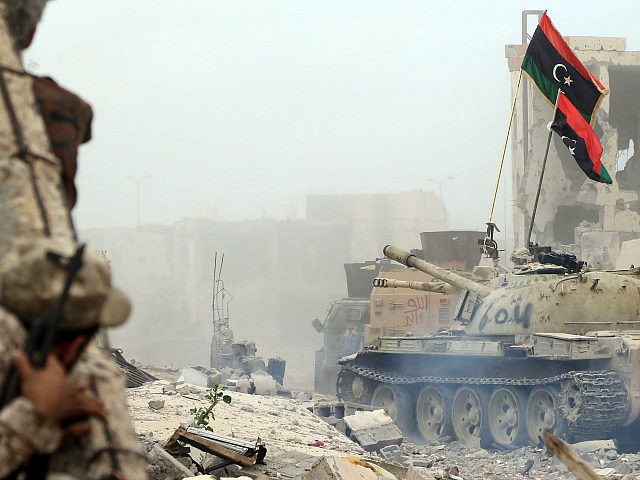President Donald Trump’s administration is reportedly considering expanding the United States’ involvement in jihadi sanctuary Libya amid concerns that Russia’s foothold in the North African country is growing.
The revelation comes as Col. Ahmed al-Mesmari, a spokesman for the Libyan National Army (LNA), tells PJ Media that former President Barack Obama and his Secretary of State Hillary Clinton “abandoned the Libyan people to face these terrorists alone.”
Following the U.S.-backed overthrow and execution of dictator Muammar Gaddafi in 2011, Libya has descended into chaos, providing a fertile ground for jihadist groups like the Islamic State (ISIS/ISIL) to flourish.
Although U.S.-backed militias pushed ISIS out of Sirte, once considered the group’s largest stronghold outside Iraq and Syria, the American military believes the terrorist organization is regrouping elsewhere in the country.
The U.S. military has already bombed ISIS outside of Sirte and warned against Russia’s growing presence in the country.
Meanwhile, Russia has continued to expand its footprint in the war-ravaged country, increasingly lending support to former Gen. Khalifa Haftar, the leader of the opposition to the U.S.-backed Government of National Accord (GNA) led by Prime Minister Fayez al-Sarraj.
Citing an unnamed official, CNN reports that the Trump administration’s “new [Libya] policy calls for closer cooperation and intelligence sharing with Haftar,” who serves as the commander of the Libyan National Army.
CNN adds:
A new diplomatic and military policy for Libya that could significantly expand US involvement in the country could be finalized by the Trump administration in the next few weeks, according to two [unnamed] US officials.
The policy, if approved, would aim to further the existing US goal of supporting reconciliation between rival factions in eastern and western areas of Libya. The policy could also lead to the eventual re-opening of the US embassy and the establishing of a new intelligence sharing effort led by US special forces, according to the officials.
In April, President Trump told reporters he did “not see a role” for the United States in Libya beyond combating ISIS.
Experts have warned of Russia’s growing involvement in the country since Trump made the comments in April.
Even Libyan PM al-Sarraj, who is also backed by the United Nations, turned to Russia later that month for help in bringing his country’s domestic conflict to an end.
Anna Borshchevskaya, an expert on Russian foreign policy at the Washington Institute for Near East Policy, told lawmakers last month that “Moscow’s foothold in Libya is growing” as Russian President Vladimir Putin “increasingly” supports former Gen. Haftar who has been compared to the late Gaddafi.
“This issue is important to watch in the months ahead. Putin increasingly supports Libya’s Gen. Khalifa Haftar, who controls the oil-rich eastern part of the country but wants more,” testified Borshchevskaya. “With the fall of Muammar [Gaddafi] in October 2011, Russia lost not only several billion dollars’ worth of investments but also access to the Benghazi port.”
Russia’s support for Gen. Haftar has already begun to bear fruit.
Last week, Gen. Haftar announced that the LNA has totally liberated Benghazi from jihadists, a move that will likely grant Russia access to the city’s port.
Moreover, CNN notes, “The US is also considering re-establishing a presence in Benghazi after a 2012 attack that killed four Americans — and also re-establishing a coordination center for some US forces and Libyan officials to facilitate counterterrorist intelligence sharing. US troops could also carry out a training and advisory role in conjunction with Libyan forces.”
Borshchevskaya told lawmakers:
Haftar (who served under Qadhafi) pursues an anti-Islamist agenda and looks to Putin to help secure his leadership in Libya at the expense of the UN-backed civilian government. Haftar is a deeply polarizing figure, one that by expert accounts is the wrong choice for the country. But for Putin he presents an opportunity to do what Moscow did in Syria… This means stepping into a vacuum left by America’s absence, gaining influence and creating a short-term fix while ensuring long-term conflict and insecurity.
In March, Gen. Waldhauser told Senators that Russia’s intervention in Libya, including Putin’s support for Gen. Haftar, is “very concerning” for the American military.

COMMENTS
Please let us know if you're having issues with commenting.